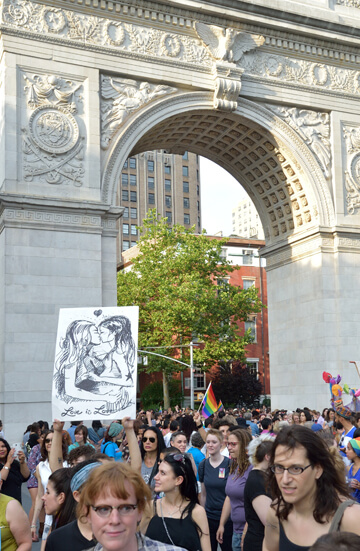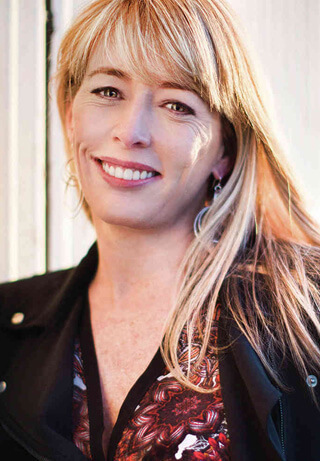Susan Sommer, Lambda Legal's director of constitutional litigation, said the Obama administration's early steps at implementing federal recognition of same-sex marriages “haven’t disappointed me yet.” | LAMBDA LEGAL
With the federal Defense of Marriage Act (DOMA) declared unconstitutional by the US Supreme Court on June 26, the more complicated task of implementing federal recognition for married gay and lesbian couples has begun.
“We applaud the administration’s quick action on important programs like immigration and federal employee benefits,” wrote Rose Saxe, a senior staff attorney in the LGBT & AIDS Project at the American Civil Liberties Union (ACLU), in an email. “For the most part, there is no barrier to the federal government respecting marriages that were validly entered into, regardless of where the married couple lives.”
The ACLU fought and won the federal lawsuit brought by New York widow Edie Windsor challenging the section of DOMA that barred federal recognition of same-sex marriages.
Advocates, Obama administration wrestle with federal programs that rely on legal residence for eligibility
On June 28, the federal Office of Personnel Management issued a guidance saying that the “legally married same-sex spouses” of federal employees were eligible for a range of employee benefits. On July 1, Janet Napolitano, the secretary of the Department of Homeland Security, directed the federal immigration services “to review immigration visa petitions filed on behalf of a same-sex spouse in the same manner as those filed on behalf of an opposite-sex spouse.”
While gay groups are applauding the Obama administration’s quick action in these two areas, other federal agencies, laws, and regulations may require more time and more significant changes.
Some Social Security benefits and rights under copyright law operate under statutes defining marriage according to the law of the state of domicile — that is, the state that the person seeking the benefit or right lives in. Changing those could require legislation. Currently, 35 states have explicit legal bans on allowing or recognizing same-sex marriages.
Some agencies and laws, such as the Department of Veterans Affairs and the Family and Medical Leave Act, use state of domicile to define marriage, but by regulation, not statute, so changes there could come from issuing new regulations. Some agencies have a mix of regulations and law defining marriage.
Still others, such as the Internal Revenue Service, have a longstanding practice of using state of domicile to define marriage, but no regulations or statutes requiring that so they may have to merely issue a new guidance to employees and perhaps retrain them.
“It’s an issue that appears in statutes and also in some regulations,” said Susan Sommer, director of constitutional litigation at Lambda Legal, a gay rights law firm. “It varies from agency to agency and from benefit to benefit.”
Lambda Legal and nine other groups researched the legal issues related to federal recognition and posted 15 fact sheets on various topics on their websites. The groups want the federal government to define marriage according to the law of the state where the marriage license was issued, known as the state of celebration.
As of August 1, 13 states and the nation’s capital will allow gay and lesbian couples to wed. An unexpected benefit of the DOMA ruling may be that couples in the six states that grant all of the benefits of marriage to same-sex couples, but do not call such unions marriages, may also be eligible for federal benefits, legal experts told Gay City News. The Washington Post, however, reported on July 8 that the federal personnel office announced that the partners of federal employees in civil unions are not eligible for spousal benefits.
The process of implementing federal recognition, which is being coordinated by the Department of Justice, is aided by having an administration headed by a president, Barack Obama, who has endorsed same-sex marriage and has cabinet-level officers who are also pro-gay.
“At this point, they haven’t disappointed me yet,” Sommer said. “There’s certainly a will there to attain the greatest amount of equality for same-sex couples.”
A wide array of advocacy groups are watching the implementation closely. There was some concern when an immigration services guidance suggested that the agency might still consider state of domicile when deciding if a couple is married.
“What they’re saying is they are generally looking at the place of celebration, but there might be some occasions when they look at place of domicile,” said Scott Titshaw, a law professor at Georgia’s Mercer University who has litigated immigration cases and published on the topic. “I’m looking for them to clarify that.”
Titshaw said that while the guidance raises questions in the near term, immigration would not present ongoing state of domicile versus state of celebration problems.
“I do think it’s a concern in some areas,” he said. “I don’t think immigration is one of the areas where it is likely to be a concern in the long term.”
Groups also continue to press Congress to pass the Respect For Marriage Act, legislation that would define marriage under federal law according to the state of celebration. Democrat Jerry Nadler, who represents Manhattan’s Upper West Side, is the sponsor in the House and has 162 co-sponsors. Dianne Feinstein, a California Democrat, is the Senate sponsor and has 41 co-sponsors.
Some changes may require “carefully planned litigation,” Sommer said, but then suggested the community should be pleased at having to navigate this thicket of federal laws, regulations, and agency practices.
“If this is the price of equality, we’ll pay it,” she said. “These are the kind of problems we should welcome… There’s nothing here that we’re not going to be able to overcome.”




































